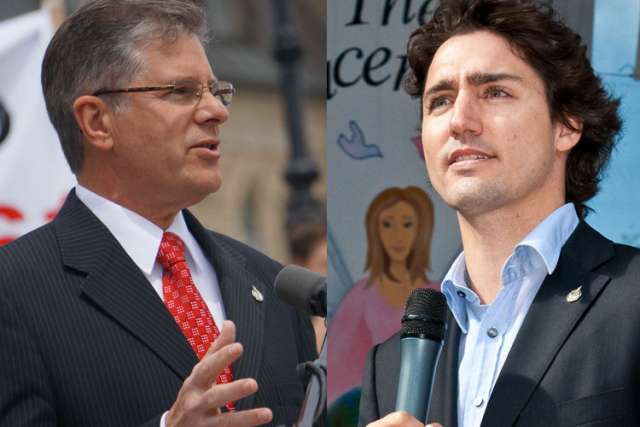After remarks that seemed to indicate Trudeau supports a woman’s “right” to abortion under any circumstance, his spokesperson issued a clarification to show opposition to the practice.
Following the May 27 Question Period, Warawa told journalists he found it “shocking” the Liberal leader would not condemn sex-selection abortion when asked by a reporter what he would say to a pregnant woman who tells him she “wants to terminate the life of her child because it’s a girl.”
“My position is very clear,” Trudeau responded. “The Liberal Party is the party standing up for peoples’ rights. And the Liberal Party will always be the party of the Charter. So we will continue to stand up for peoples’ rights and not legislate them away.”
“Ninety-two per cent of Canadians think it’s abhorrent,” said Warawa, who tried to get Motion-408 before the House of Commons to condemn gendercide but a subcommittee deemed the motion non-votable last year.
“I think anybody that’s using their brain would say it’s abhorrent to discriminate against girls in this way, to say it’s okay to just end a pregnancy strictly because it’s a girl.”
In an e-mail May 28, however, Trudeau’s communications director Kate Purchase clarified his position on gendercide.
“Mr. Trudeau and the Liberal Party do not condone sex-selective abortion,” Purchase said. “The termination of pregnancy is a medical procedure which is decided only between patient and physician, based on clear medical/clinical guidelines.”
Last year, after Motion-408 was declared non-votable, there was speculation of a backbencher revolt among pro-life MPs in the Tory Caucus for Prime Minister Stephen Harper’s insistence he would not allow the abortion issue to be re-opened. When the Prime Minister’s Office has been asked to comment on this recently, the reply has been the standard response of an unwillingness to re-open the abortion debate.
But Warawa defended his party as “the only party that provides free opportunities to come out with positions like this.”
Trudeau is not only facing opposition from across the aisle but also from within his own caucus. Liberal MP John McKay, known for his staunch pro-life views and voting record, said in a private conversation he initially thought Trudeau’s remarks about banning pro-life candidates were a “bozo eruption” indicating “he didn’t actually think about what he said.” The conversation was secretly taped and passed on to CTV News, which also reported McKay as saying: “But even more disturbing is that his brain trust might have actually thought about this, and if they did … it scares the hell out of me. If you don’t know this is a toxic issue for a population then you have no political sense whatsoever.”
Trudeau told journalists after Question Period May 27 McKay had apologized to him and as far as he was concerned the matter is closed.
“Obviously, Mr. McKay, as we all know, has very strong personal feelings on this issue and I can understand how those personal feelings might have overflowed, but my role as leader of the Liberal Party is to make sure that Canadians know that the Liberal Party will be unambiguous when it comes to standing up for women’s rights and that’s what we will continue to do,” Trudeau said.
Legal experts have pointed out the Charter does not grant a right to abortion, nor did the Supreme Court of Canada in striking down Canada’s abortion laws in the Morgentaler decision of 1988. The decision left a legal vacuum, but the justices invited Parliament to legislate on the matter provided the woman’s rights to life and security of the person were respected.


